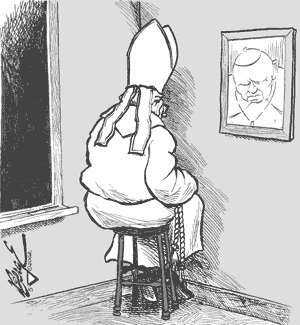Wesley Hill has written well of Dietrich Bonhoeffer's argument against the religious blackmail of those who use grace as a cure all to the sad and empty feelings within but who have not yet rooted out and exposed sin so that the individual can be moved to repentance.
Krister Stendahl (why do we always have to be reminded that he said he was Lutheran?), of course, is the famous author of the opinion that Augustine and Luther got Paul wrong (as did nearly everyone, it seems). Stendahl disdains guilt as a component in repentance or a tool in the hand of God and instead suggests that Christian freedom allows a robust conscience in which guilt need not play any major role. Bonhoeffer is one of many Christian thinkers who think the Stendahl's perspective is just plain wrong.
A quote from Ian MacFarland puts Bonhoeffer well: Dietrich Bonhoeffer was highly critical of those styles of evangelistic
preaching that seek first to persuade people how wretched and miserable
they are and only then introduce Jesus Christ as the cure for their
condition. He called it ‘religious blackmail’ and thought it both
ignoble and completely inconsistent with Jesus’ own preaching. . . .
Bonhoeffer objected that such preaching confused sin with personal
weakness or guilt.
You can read it all for yourself here. What intrigues me is a few lines later in Hill's piece:
Too often we Christians are heard as saying something along the following lines:
“Your life of casual sex (or cohabitation, or homosexuality) surely
must be leading you to feel empty, unfulfilled, and jaded. But we have
the solution for those unpleasant feelings!” To which the reply is
often: “I’m sorry to disappoint, but I don’t feel excessively
guilty or ashamed or unfulfilled. On the contrary, my gay partnership
has given me more emotional peace than I’ve ever had.”
I well understand this. Our materialistic culture comes into question only when we cannot afford what we want. Our confidence in the flesh is shaken only when no pill is available to fix our affliction. Our sexual indulgence is a problem only when we are not getting as much pleasure from it as we think we ought. The problem we face today is not a culture awash in guilt and feeling the prick of conscience. The problem we face today is that we feel no guilt for our self-indulgence. We have even gone one step further -- politically we have translated this self-indulgence into the idea that somebody else should pay for our contraception costs and the financial success of others should make up for my own poor economic choices. No, it is not true of all and I am painting with a broad brush here but the whole process leading up to the election has solidified the idea that we are not responsible for our failures, only for making sure that the success of others subsidize them.
So how do you preach grace to a people who feel no guilt, who do not call their behavior sinful, and who do not seek forgiveness? You do it by preaching the Law. When the Law has convicted the hearts of people and brought forth the fruit of guilt and the rightful despair over the consequences of our sin, then grace can speak forgiveness, the gift of an alien righteousness that belongs to Christ, and the promise of a future in which the past is undone.

No comments:
Post a Comment